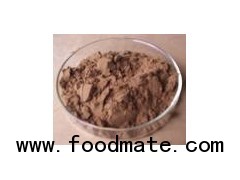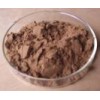apperance:brown
Min order:10kg
Packing:In 10 kg or 20 kg drum with alumimu
Product Name: Olive Leaf Powder Extract
Latin Name: Canarium album Raeusch.
De
As a symbol of peace, security, and plenty, olive trees have offered food and shelter to people from the beginning of human history. They are believed to have originated around the shores of the Mediterranean well over 5,000 years ago, and were first brought to America in the 15th century. Evidence suggests that drinking olive leaf tea has been a method employed for many hundreds of years by Middle East cultures to treat such disorders as coughs, sore throat, cystitis, and fever. In addition, poultices of the olive leaves are used to treat boils, rashes, warts and other skin problems. It wasn't until the early 1800's, however, that olive leaves came to the attention of the medical establishment. A French colonel , Etiene Pallas, M.D., examined the leaf's constituents and isolated a crystallizable compound he named vauqueline, a bitter substance to which he credited most of the febrifuge (fever-reducing) properties. It was also looked as a start of modern researches of olive leave extract.
Function:
1. Broad Spectrum Antimicrobial
Olive leaf extract is a broad-spectrum antimicrobial agent for internal therapeutic use. The most active compound thus far identified in olive leaves is oleuropein, a bitter monoterpene glycoside of the class known as secoiridoids. Oleuropein and products from its hydrolysis have unique attributes to the anti-microbial functions of the olive leaf. Possible mechanisms are listed as below:
* A critical interference with certain amino acid procedures necessary for a specific virus, bacterium, or microbe to thrive
* Interference with viral infection and/or spread by inactivating viruses or by preventing virus shedding, budding, or assembly at the cell membrane.
* Direct penetration into infected host cells and irreversible inhibition of microbial replication.
* Neutralization of the retrovirus' production of reverse tran
Olive Leaf Extract has a resounding impact against infectious and virulent microbes.
It acts to halt the outbreak of such disorders as colds and other viral diseases, fungus, mold and yeast invasions, bacterial infections both slight and serious, and infestations of protozoan parasites. More than a preventative, olive leaf extract offers a safe and effective therapeutic procedure in the ongoing battle against microbe. Studies also demonstrate that the extract only attacks pathogens, and not friendly gut bacteria, which is another benefit over man-made antibiotics.
2. Immune System Support
Some physicians have already successfully employed Olive leaf extract as therapy for patients who suffer from medically puzzling diseases such as Chronic Fatigue Syndrome and Fibromyalgia. This may possibly be the result of direct stimulation to the immune system.
3. Cardiovascular Diseases
Some cardiovascular diseases also respond favorably to the extract. Coronary artery disease seems to respond well to the introduction of Olive leaf extract. According to laboratory and preliminary clinical studies, extract of Olive leaf alleviates disorders related to insufficient arterial blood flow, including angina pectoris and intermittent claudication. It helps eliminate atrial fibrillation (arrhythmia), lowers high blood pressure, and inhibits LDL cholesterol from oxidizing.
Safety: Researchers checked for oleuropein toxicity by giving albino mice doses as high as 1 g/kg of body weight for seven days. No death was provoked and the dosage yielded no toxic effects. In fact, oleuropein in olive leaf extract is so safe that the investigators failed to determine the lethal dose (LD50).
Dosage: Dosages recommended by health professionals include one or two capsules totaling 500 mg daily for preventive purposes. For treating symptoms, the dosage varies with the severity of disease but ranges from four to twelve capsules daily, or 2 to 6 grams in total of extract.
Chemistry:The formula of oleuropein (C25H32O13) makes it a member of the iridoid group, a uniquely structured chemical class that contains a carbohydrate component appearing as D-glucose glycoside.
Oleuropein C25H32O13








